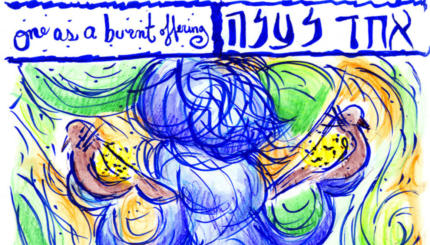Reprinted with permission of the Jewish Theological Seminary.
After a profusion of dietary regulations, our parasha
reemphasizes the fundamental purpose of Judaism: "For I the Lord am your
God: you shall sanctify yourselves and be holy, for I am holy" (Leviticus 11:44).
A pervasive sense of holiness is the key to this-worldly salvation. To live
wisely requires self-control. There is no creation without contraction. To
spring we first need to coil. The regimen of Judaism is to help us keep the big
picture in sight, make wholesome distinctions and prevent the numbing of our
spiritual sensibility. Transgressions erode our inner life, while doing mitzvot
brings an infusion of holiness. In the words of the Rabbis: "If we embark
on hallowing our lives on earth, we will be hallowed abundantly from
above" (Babylonian Talmud Yoma 39a).
Since this vision of life is a tall order for most of us,
which we approximate at best only partially, religious leadership in Judaism
carries a special burden. Its qualifications are defined by the ideal rather
than the real. As a bridge between the human and divine, religious leaders
serve as symbolic exemplars (Jack H. Bloom’s term), the embodiment of the best
to which Judaism aspires. The book of Proverbs celebrates the righteous as
"an everlasting foundation," unharmed by the whirlwind that topples
the wicked (10:25). Playing on the Hebrew of that phrase (yesod ‘olam),
the Talmud asserts that even a single righteous person can sustain the world (Babylonian
Talmud Yoma 38b). That is, the piety exhibited in one life has the power
to touch many, indeed, to ameliorate the human condition.
What brings me to reflect on the nature of religious
leadership is the narrative fragment embedded in the middle of our parasha.
There we find the consecration of Aaron and his four sons as the custodians of
the Tabernacle darkened by the calamitous death of two of them. Nadab and Abihu
on their own, uncommanded by God, "offered before the Lord unauthorized
coals" (Leviticus 10:1 trans. Jacob Milgrom), an impulsive act which
brought on instantaneous death. Proximity to the holy tolerated no digression.
Its numinous quality, if disregarded, can wreak havoc. With greater
responsibility came the need for a higher degree of punctiliousness.
With your help, My Jewish Learning can provide endless opportunities for learning, connection and discovery.
This, at least, is how I choose to understand Moses’ words
of comfort to Aaron in devastation’s wake: "This is what the Lord meant
when he said: ‘Through those near to me I shall sanctify myself, and before all
the people I shall glorify myself’" (Milgrom’s trans.) The Rabbis took
Moses to be referring back to Exodus 29:43, where God seemed to allude darkly
to a sanctification of the Tabernacle by the death of those closest to God (Babylonian
Talmud Zevahim 115b). God deemed Nadab and Abihu to be even more pious
than Moses and Aaron. Their death made God’s awesomeness still more manifest.
To preserve the consolatory force of Moses’ words, the Rabbis stretched the
meaning of the biblical text. My preference is to read Moses’ words as a
reprimand. Nadab and Abihu failed the test of religious leadership. Those
serving God must be paragons of piety. Their behavior is what sanctifies God’s
name for a wayward, if well meaning, flock. Aaron’s silence bespeaks the
bitterness of the rebuke.
Moses and Aaron would eventually be judged by the same
exacting standard. When Moses in a state of exasperation failed to follow God’s
command to extract water from the rock by speaking to it, God deprived him and
Aaron from the fruition of their lifelong labor. Someone else would take the
Israelites into the land promised their ancestors.
While most of us might be readily forgiven for an infraction
executed in justifiable pique, not so the symbolic exemplars of God’s will. Nor
is this an isolated case in the pages of the Bible. Throughout, God demands of
religious leaders a loftier standard of moral rigor and fidelity, prompting the
Rabbis to observe that God permits the righteous no more than a hair’s breadth
of deviation (Babylonian Talmud Yevamot 121b). In the same exacting
spirit, the Rabbis insisted that when the wicked finally get their just
deserts, the disaster will consume the righteous first for failing to have
reversed the widespread moral decline (Babylonian Talmud Bava Kama 60a).
To work for the Lord has its price!
Religious leadership constitutes an island of calm in a
turbulent sea, a beacon for those gone astray. For the Rabbis anything less is
an act of sacrilege. The Torah commands that every community must have its
judicial officers: "You shall appoint magistrates and officials for your
tribes, in all the settlements that the Lord your God is giving you"
(Deuteronomy 16:18). A few verses later we are warned: "You shall not set
up a sacred post beside the altar of the Lord your God …" (16:20). The
two verses seem to be unrelated. Yet from their proximity the Rabbis derived a
profound proposition: "That whoever imposes a judge on a community who is unworthy
is guilty of erecting an artifact of idolatry in Israel’s midst" (Babylonian
Talmud Sanhedrin 7b). It is clarity and not confusion, constancy and not
arbitrariness, self-respect and not self-deprecation that should emanate from
those who have assumed responsibility for elevating the Jewish people to
"a kingdom of priests and a holy nation" (Exodus 19:6).
Talmud
Pronounced: TALL-mud, Origin: Hebrew, the set of teachings and commentaries on the Torah that form the basis for Jewish law. Comprised of the Mishnah and the Gemara, it contains the opinions of thousands of rabbis from different periods in Jewish history.
Torah
Pronunced: TORE-uh, Origin: Hebrew, the Five Books of Moses.


